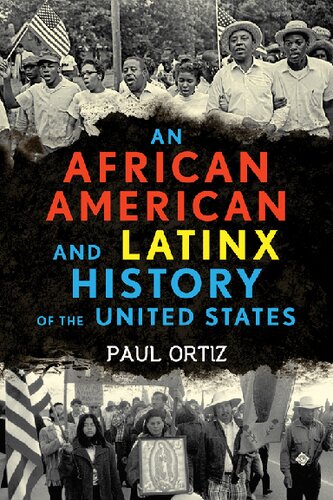
An African American and Latinx History of the United States
REVISIONING HISTORY
کتاب های مرتبط
- اطلاعات
- نقد و بررسی
- دیدگاه کاربران
نقد و بررسی

November 13, 2017
In the latest entry of the Revisioning American History series, Ortiz (Emancipa-
tion Betrayed), associate professor of history at the University of Florida, celebrates the lives and achievements of men and women of African and Latin-American heritage within the broader narrative of U.S. history. Ortiz emphasizes these groups’ contributions to struggles against slavery, imperialism, and classism throughout the Americas, chronologically organizing instances in which they played a central role in liberation movements, both within the U.S. and across the Western Hemisphere. Beginning with the Haitian Revolution (1791–1804), which gave rise to an “emancipatory internationalism” and inspired uprisings against slavery and colonialism throughout the Americas, Ortiz goes on to analyze the confrontation between Mexican advocates of independence and American politicians—such as presidents Madison, Monroe, and John Quincy Adams—who feared the hemisphere-wide spread of liberation ideology. Later chapters examine the international ramifications of the Civil War, African-American involvement in the abolition of slavery in Cuba, and the ways that racism undermined U.S. working-class solidarity. While each chapter is insightful, lucidly written, and extensively researched, the book reads more like a series of articles than a cohesive monograph. Ortiz’s work has much to offer, but does not fulfill the promise of its title.

November 1, 2017
A concise, alternate history of the United States "about how people across the hemisphere wove together antislavery, anticolonial, pro-freedom, and pro-working-class movements against tremendous obstacles."In the latest in the publisher's ReVisioning American History series, Ortiz (History/Univ. of Florida; Emancipation Betrayed: The Hidden History of Black Organizing and White Violence in Florida from Reconstruction to the Bloody Election of 1920, 2005, etc.) examines U.S. history through the lens of African-American and Latinx activists. Much of the American history taught in schools is limited to white America, leaving out the impact of non-European immigrants and indigenous peoples. The author corrects that error in a thorough look at the debt of gratitude we owe to the Haitian Revolution, the Mexican War of Independence, and the Cuban War of Independence, all struggles that helped lead to social democracy. Ortiz shows the history of the workers for what it really was: a fatal intertwining of slavery, racial capitalism, and imperialism. He states that the American Revolution began as a war of independence and became a war to preserve slavery. Thus, slavery is the foundation of American prosperity. With the end of slavery, imperialist America exported segregation laws and labor discrimination abroad. As we moved into Cuba, the Philippines, and Puerto Rico, we stole their land for American corporations and used the Army to enforce draconian labor laws. This continued in the South and in California. The rise of agriculture could not have succeeded without cheap labor. Mexican workers were often preferred because, if they demanded rights, they could just be deported. Convict labor worked even better. The author points out the only way success has been gained is by organizing; a great example was the "Day without Immigrants" in 2006. Of course, as Ortiz rightly notes, much more work is necessary, especially since Jim Crow and Juan Crow are resurging as each political gain is met with "legal" countermeasures.A sleek, vital history that effectively shows how, "from the outset, inequality was enforced with the whip, the gun, and the United States Constitution."
COPYRIGHT(2017) Kirkus Reviews, ALL RIGHTS RESERVED.

January 1, 2018
The story of American exceptionalism and America as a beacon of liberty is one well understood and oft repeated. According to Ortiz (history, Univ. of Florida; Emancipation Betrayed), however, this is a myth that does not hold up when U.S. history is viewed through the lens of African American, Latinx, and indigenous perspectives. For these populations and other marginalized groups, the American experience has not been one of liberty and democracy but of oppression and white dominance. By combing through hundreds of publications created by Native, African, and Latin Americans as well oral histories, Ortiz is able to paint a picture of this country's history that differs greatly from the traditional narrative. He presents the past not as an "exceptional" story of democracy but part of the larger Global South (Latin America, Caribbean, and Africa) fight against imperialism. This slim volume barely scratches the surface of a topic that Ortiz admits is new territory for scholars, but it does provide a challenging and necessary approach to understanding our history. VERDICT A must-read for those who want a deeper perspective than is offered in the traditional history textbook--Michael C. Miller, Austin P.L. & Austin History Ctr., TX
Copyright 2018 Library Journal, LLC Used with permission.

























دیدگاه کاربران